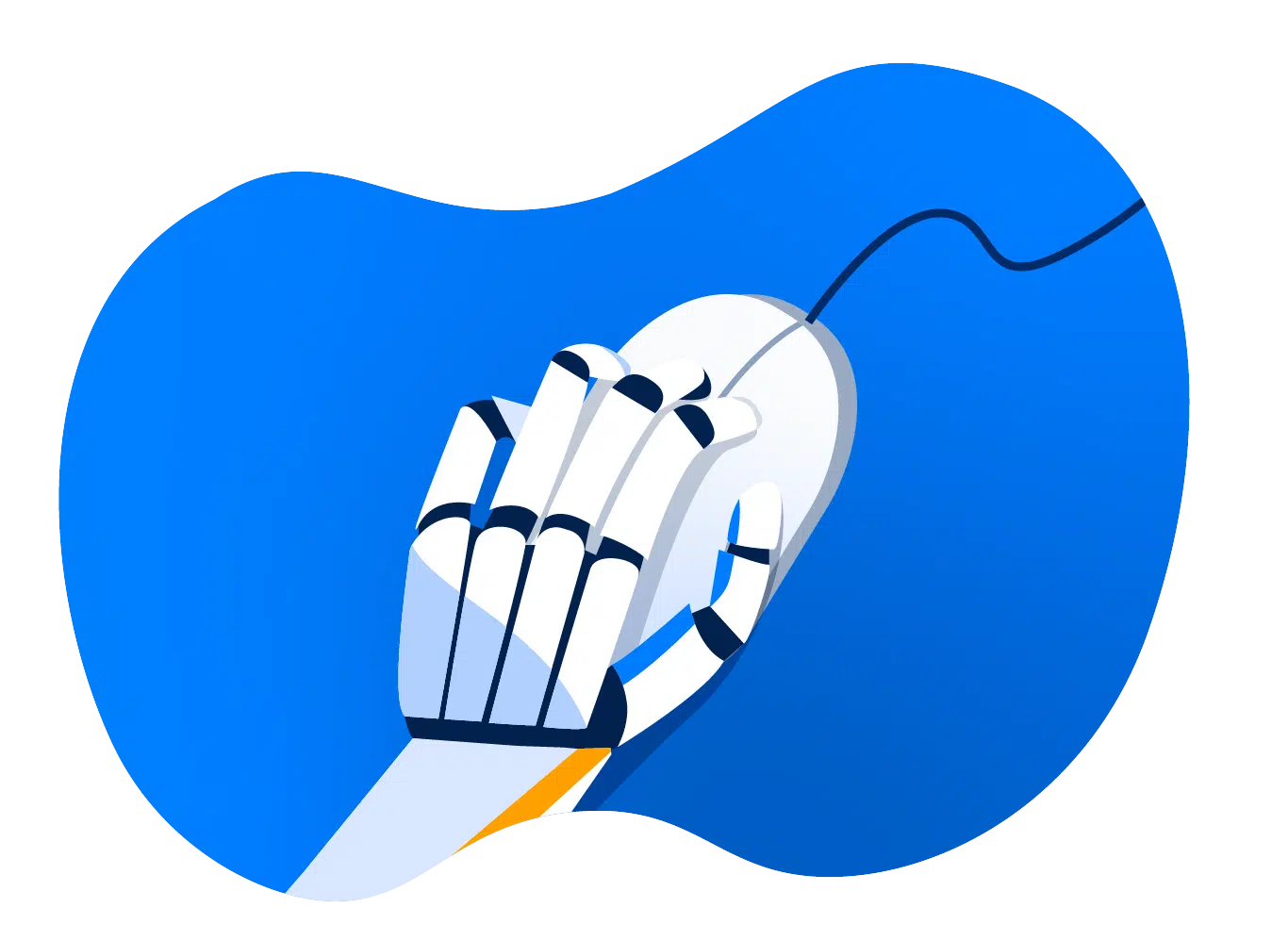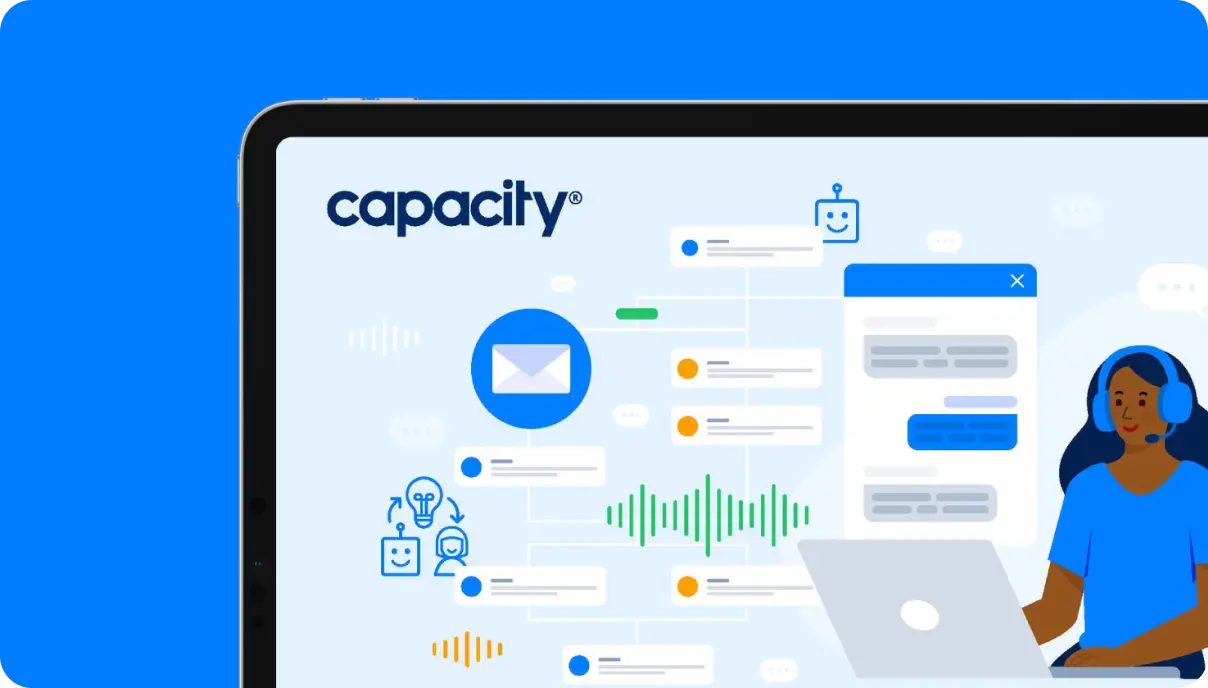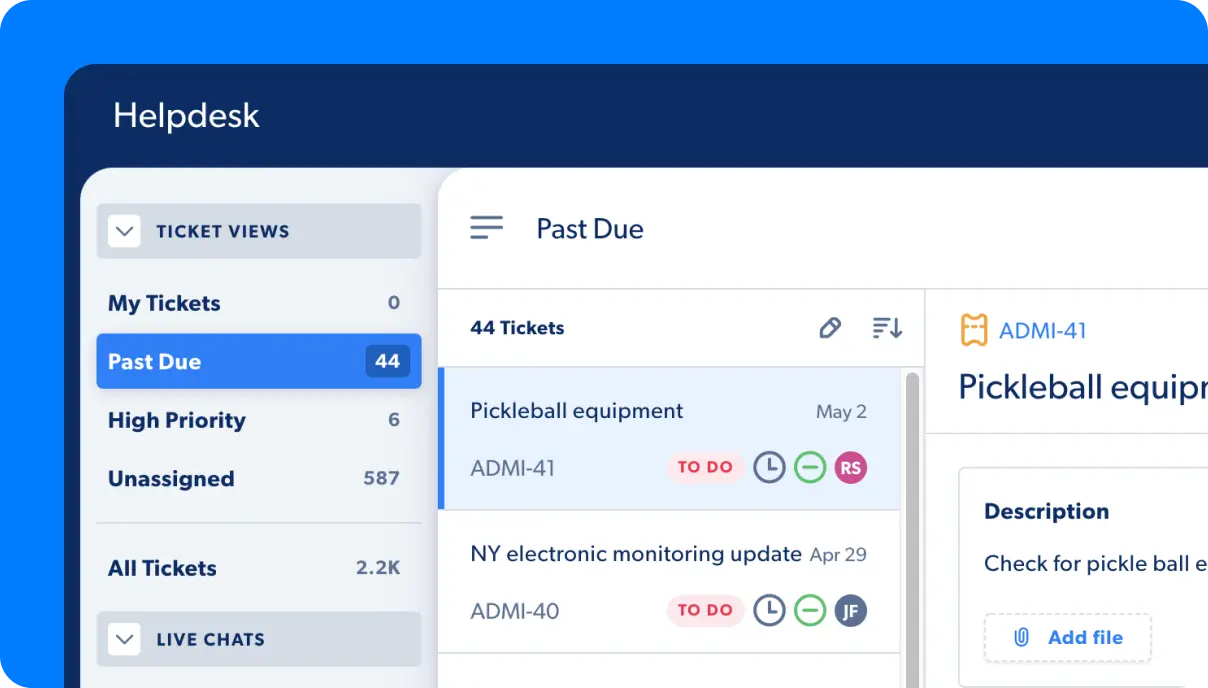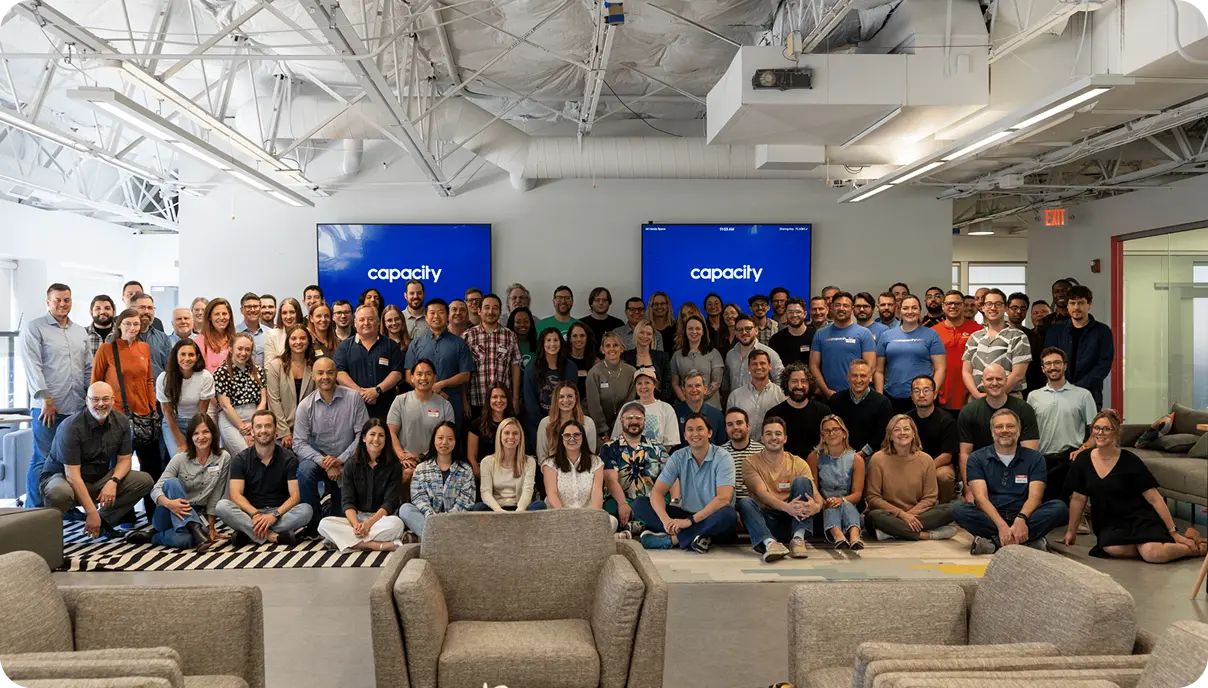Picture this scenario: it’s Monday morning and you’re already dreading the long list of customer support inquiries that have piled up over the weekend. But wait, what if there was a tool that could handle those requests for you? Enter AI chatbots and conversational AI – technology that handles customer inquiries with ease. Ultimately, reducing the workload on your team. Not only does it streamline your support processes, but it also enhances the customer experience with faster response times and personalized interactions.

It’s estimated that by 2025, AI will power 95% of interactions between customers and businesses.
It’s no wonder why businesses around the world are adopting this game-changing tool to enhance their support services and revolutionize how they operate. The future of customer service is here, and conversational AI is leading the way.
What is conversational AI?
Conversational AI refers to a form of artificial intelligence that enables computers to comprehend, handle, and produce human language. Conversational AI bots are advanced chatbots, also known as AI chatbots.
This conversational AI technology uses artificial intelligence to process, interpret, and understand human language. It is everywhere – When you talk to intelligent chatbots or virtual agents online. Thanks to NLP and machine learning, conversational AI is constantly evolving. Every interaction helps it learn the ins and outs of generating appropriate responses.

What is a chatbot vs conversational AI?
It’s easy to confuse conversational AI with chatbots. When people talk about chatbots, they typically mean bots with pre-written questions and answers. The bot is unable to deviate from a script. Chatbots can help people with simple needs like where to find account information or understanding policies. Conversational AI goes beyond these limited functions. It allows a site visitor to ask a question in a natural way and get a human-like response back. Chatbots follow a script, while conversational AI uses machine learning to communicate with you. With a conversational AI platform, users have the ability to lead the conversation — in their own words.

Conversational AI chatbots constantly refine their responses as they learn from their interactions. These intelligent bots collect new data along the way to provide users with accurate, relevant responses. This leads to more personal, meaningful customer interactions over time.
How conversational AI works
Conversational AI is shaking up the world of business, providing organizations with a dynamic new way to interact with their audience.
But how does it work?
Essentially, conversational AI is made up of a series of complex algorithms that enable machines to interact with humans in a natural and intuitive way. This is thanks in large part to natural language processing (NLP), which allows machines to understand and respond to human language in real-time. Put simply, conversational AI is able to understand slang, acronyms, and even typos.
This technology allows businesses to use AI solutions internally and externally. Internally, it can help to streamline communication and increase productivity, while externally, it can enhance customer service, boost engagement, and drive sales. The potential applications of conversational AI are endless, and its impact on how we interact with technology is only beginning to be felt.

4 benefits of conversational AI
As consumers become more accustomed to using conversational AI, so must businesses. The personal touch of this AI has the power to transform orgs of all shapes and sizes. Let’s take a look at some of the top benefits:
1. Increased customer satisfaction
Interacting with a scripted chatbot is often a cold, uninviting experience. If there is no predeveloped path for a question, users hit a dead end. An exchange using conversational AI provides customers with a more nuanced experience. Giving users a natural way to find instant answers is driving success for companies using this technology. In fact, 4 out of 5 executives said that after implementing conversational AI tech, customer satisfaction, service delivery, and the overall quality of agent performance improved significantly.

2. 24/7 Availability
The internet never sleeps — so your business can’t either. Customers want what they want, and they want it now. That means being available to your customers at all times is essential for success. Conversational AI chatbots are ready whenever your customers need help. Customer satisfaction is crucial to retention and acquisition of customers.
3. Improved data collection
Conversational AI provides businesses with a wealth of information. Interactions reveal consumer trends and other actionable insights. A software company could use data from tech support inquiries to improve its products. Conversational AI saves and interprets every conversation in a comprehensive knowledge base. When a user asks a question that is not currently in the system, the AI chatbot automatically adds the info and saves it for the next time that question is asked. This data helps companies continuously improve the overall customer experience.

Get Started with AI
Capacity’s customized AI Assessments can help:
- Identify opportunities for using AI
- Prioritize use cases that fit your goals
- Build an action plan for implementation
4. Cost savings
Each year, businesses spend over $1 trillion on customer service calls. Conversational AI solutions are designed to slash these costs by one-third. By trimming labor costs, AI benefits the bottom line while still providing great customer experiences. Between self-service automation and conversational AI, support costs are lowered significantly.
How conversational AI chatbots impact businesses
Conversational AI platforms increase business efficiency and better serve customers whenever they need help. They improve customer satisfaction and help organizations scale while driving revenue around the clock. And it doesn’t just save money – It saves time, too. Conversational AI can often answer a customer’s question without help from a real person. This gives your customers an easier, faster, and more satisfying experience.
Time savings have a significant impact on businesses. Conversational AI technology saved companies an estimated 2.5 billion labor hours as of 2023. This allows employees to spend more time on advanced needs and build customer loyalty. In a recent survey, nearly 88% of respondents noted measurable improvements in complaint resolution speed thanks to AI tech, and 74% reported that AI is instrumental in freeing up agents to spend more quality time with customers.

What a conversation with AI looks like
If you’re not familiar with conversational AI, you might think of it as a robot that spits out canned responses to your questions. But the truth is far more complex and fascinating.
Think of a conversation with a human: we don’t just spit out answers, we take in a wide range of contextual information and respond accordingly. Conversational AI works the same way, using natural language processing to understand what you’re saying and then respond in a way that feels human-like. You might ask a chatbot a question about the weather, but instead of just giving you a weather report, the AI might ask for your location and then give you a personalized report based on that information. The end result is a conversation that feels incredibly realistic, something that blurs the line between human and machine. And as the technology continues to evolve, the sky’s the limit for what we’ll be able to achieve with AI.

What is an example of conversational AI?
Here are five conversational AI examples that demonstrate the breadth of what this technology can do:
1. SaaS support
Conversational AI is revolutionizing the world of SaaS by providing businesses with smarter, more efficient customer service solutions. From chatbots to virtual assistants, this innovative technology can effectively handle customer inquiries, allowing businesses to reduce costs and improve customer satisfaction.
Conversational AI can help businesses streamline workflows, increase operational efficiency, and boost revenue. With the ability to process natural language and provide personalized responses, conversational AI is quickly becoming a must-have tool for businesses in the SaaS industry. By embracing this powerful technology, businesses can take customer service to the next level and stay ahead of the competition.
2. HR and internal operations
Conversational AI technology can revolutionize the way your organization operates – Starting with HR and onboarding. Supporting your team is just as important as supporting your customers, so providing them with the proper tools to do their jobs is key. With AI solutions, it’s easy to give your team strong support. Here’s a few examples of common HR tasks your org can automate using AI chatbots:
- Onboarding new team members
- Product or software training
- Approving PTO Requests
- Updating employee information
- Gathering employee data
Recruiting new employees can also benefit from conversational AI solutions. Businesses are incorporating this tech into a variety of applications. For example, around 35% of organizations have stopped using the traditional job application model. Instead, these companies use a recruiting process that relies on AI.

3. AI voice assistants
The most common AI example in the world today: voice assistants like Siri, Alexa, and Google Assistant. They learn from their mistakes, using machine learning to improve responses and match intent. Using conversational AI technology means that whether you’re asking about the local weather, finding the ingredients to a recipe, or playing a song, you’ll receive a natural, human-like response.
4. Improving IT support
Conversational AI is instrumental in helping software companies provide better technical support. The AI deflects and prevents over 90% of common queries from hitting support teams, helping you win — and keep — more customers. Integrating your knowledge base makes support even better and helps your users find answers quickly and accurately.

Automating support with conversational AI chatbots not only improves the customer experience, but the employee experience as well. For example, instead of searching endlessly for one document, support teams can ask the bot. Teams save hours of unnecessary work that they can now spend on building customer relationships.
5. Support for mortgage lenders
Borrowers want answers like – yesterday. Not just any answers, but personal, accurate ones. It’s easy for loan officers and brokers to get overwhelmed with rising expectations (and rising interest rates). Your clients deserve a superior experience – And this is where conversational AI can help.
With rock-solid security and top-notch service, AI platforms seamlessly integrate with your most used apps and provide access to the latest guidelines from Fannie, Freddie, USDA, FHA, and VA. Whether you work for a small credit union or a large wealth management firm, conversational AI gives your clients specific answers and quick service any time of day or night.
Top 4 conversational AI software
When you’re looking for conversational AI solutions, it’s important to think about your organization’s goals. Think about your company’s pain points and how many tedious tasks are completed on a weekly basis. Calculating how much time is spent answering customer FAQs, responding to emails, or finding documents is a good first step to finding the best conversational AI platform for your org. . Here are a few of our favorite options to get you started:
1. Capacity
Your one stop shop for everything conversational AI. Capacity integrates securely with tech stack and uses conversational AI technology to support internal employees and external customers. Through self-service, Capacity frees teams up to focus on strategic initiatives only humans can do, allowing teams to do their best work.
Capacity is an AI-native knowledge-sharing platform that’s truly intelligent. If Capacity doesn’t know the answer to a customer’s question, it requests help from a human agent, and will automatically add the answer in the knowledge base for the future. Harnessing the power of NLP and machine learning tech, Capacity’s AI chatbot is constantly learning and improving. In addition to top AI compatibilities, Capacity is a support automation platform – providing users with helpdesk automation, live chat, and knowledge base features to completely revamp how companies handle support.

Automate Your Work
Capacity’s enterprise AI chatbot can help:
- Answer FAQs anytime, anywhere
- Find relevant documents within seconds
- Give surveys and collect feedback
2. MindMeld
MindMeld is an AI solution that can be used by businesses in a variety of industries. However, it does require technical knowledge to develop production-quality AI applications successfully.
3. Kore.ai
Kore.ai is a full-featured platform that’s customizable. It performs well in humanizing bot interactions. It has the potential to improve the user experience from all sides, but it’s optimized for use by large businesses.
4. Murf.AI
Murf.ai is focused on providing users with excellent voice overs and text-to-speech solutions. They use NLP technology to give human-like voice overs to clients. While they are a great point-solution for businesses, they lack the support aspect of other AI software.
Meet Capacity: Your conversational AI platform
Conversational AI can do a lot more than simple tasks compared to other chatbots. It improves the customer experience, helps your employees do their best work, and drives business growth. This is why we think Capacity is the secret to improving internal and external support.
Capacity can answer over 90% of customer inquiries using AI-powered solutions.
Need convincing? Just ask a few satisfied customers why they chose to innovate with Capacity and take support to the next level. Orgs across the world are already implementing AI technology into their business strategies.
If you’re ready to get started, see Capacity in action!
See why 1200+ companies choose Capacity. Try it for free today!













































